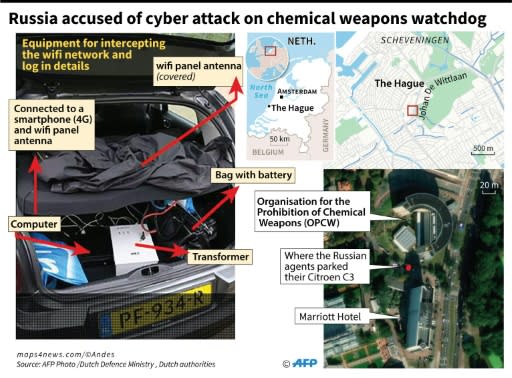Dutch PM defends decision not to arrest Russian spies

Dutch agents decided not to arrest four Russians accused of plotting a cyber-attack on the world's chemical weapons watchdog because it was "not a criminal inquiry", Prime Minister Mark Rutte said Friday. The Netherlands said Thursday it had immediately expelled the agents from GRU military intelligence in April for trying to hack the Organisation for the Prohibition of Chemical Weapons (OPCW) in The Hague. But the decision has come under scrutiny after the US announced the same day that the four Russians were among seven people it had indicted over a global hacking conspiracy. "It was an investigation in the framework of the law by the intelligence and security services. It was not a criminal inquiry," Rutte told a weekly news conference when asked why the men were not arrested. "The priority was not just to stop this operation... but also to obtain as much information as possible on the activity of these Russian spies," added the Dutch premier. No other countries had raised the issue, Rutte added. The men entered the country on Russian diplomatic passports on April 10 and were caught red-handed on April 13 with a car full of electronic equipment in the Marriott Hotel next to the OPCW. Britain said it had helped thwart the cyber attack targeting the wifi and passwords of the agency, which was at the time probing the nerve agent poisoning of a former Russian double agent in the UK. Dutch officials said they had found a trove of evidence including an antenna, a laptop and even a taxi receipt from the GRU HQ to Moscow airport. The men were then taken to Amsterdam's Schiphol airport where they were immediately put on a flight to Moscow. "In accompanying them immediately to the frontier, we were also able to seize their belongings, and they were interesting to analyse. It's for these reasons that the director of the MIVD (Dutch intelligence agency) decided" not to arrest them, " Rutte said. "It's the choice he made. It's not a criminal inquiry, it's an espionage investigation under the intelligence services, to disrupt an espionage operation. And that's how it happened." MIVD chief Major-General Onno Eichelsheim had given a similar explanation on Thursday of the decision not to arrest the men. The US Justice Department said the seven alleged GRU members indicted on Thursday had targeted not only the OPCW but also the US Democratic Party, world footballing body FIFA, the World Anti-Doping Agency, and US nuclear energy company Westinghouse. Map and details of the thwarted cyber attack on the Organisation for the Prohibition of Chemical Weapons, for which the Russian agents were expelled from the Netherlands, not arrested

